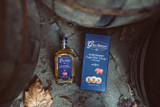Does Whisky Get Better With Age?
Searching for a quality whisky can take time and effort. There are a lot of things that go into the taste and scent profile of a whisky. Its flavour comes from the distillery, its water source, the grain recipe, how the barley is dried, how it’s distilled, and so on. However, given that the age of the whisky is often featured on the bottle, it’s only natural to wonder how time changes it as well.
So, with that in mind, we’re asking the question: does whisky get better with age? How does time affect the taste of whisky, and does this continue in the bottle itself?
Whisky and the Aging Process
It takes about a week to distil whisky in its original form, but the majority of time spent making whisky is the ageing process, which happens in barrels. At a minimum, most whiskys are aged for 3 years, but you can get bottles aged up to 25 years or even more before they’re bottled. Charred or toasted oak is used for the barrels and this helps to draw out butanol and methanol, making the taste smoother. The whisky also gains flavour from the cask itself, and the casks are often treated with spices and other flavourings to enrich the whisky further.
So, Older Is Better?
It’s not as simple saying that older whisky is better, but there is definitely going to be a change in flavour depending on how long it has been barrelled. Whisky that is aged for very long in a barrel (over 25 years) can start to lose the taste of the grain. However, in most cases, more years in the barrel means a more sophisticated taste with more notes to savour.
Blending And Age
The way that the whisky is made will have a big impact on how it tastes. When it comes to a single malt whisky, the taste tends to remain fairly similar whether it’s a 3-year, 8-year, 12-year or otherwise. It’s just that the longer it’s in the barrel, the smoother it gets and the more it gets the hints of the barrel’s flavour as well. For blends, different grains can tend to “dominate” the taste depending on how long it’s been left to age for. While single malts get more sophisticated but keep mostly the same kind of flavour profile, blends can change a lot.
Does Being In The Bottle Change The Taste?
A lot of people will say that having whisky age “in the bottle” doesn’t change the taste. It’s true that it doesn’t work like wine, people don’t leave whisky in the bottle to improve its taste. However, factors such as oxidation and exposure to sunlight can change the taste of whisky that has been sitting on the shelf. Most enthusiasts will agree that the change is not for the better, however.
Hopefully, the information above has you feeling more informed about whisky and how the ageing process can affect its taste. It’s not always a simple answer, but time, especially spent in the barrel, will have a big impact on the taste of whisky.
Recent Posts
-
The Ultimate Lakeside Labour Day with Glen Breton Single Malt Whisky
The Perfect Long Weekend by the Lake with Glen Breton Single Malt Whisky As the final long weekend …2025 Aug 12th -
2023 L.A. Spirits Awards Glen Breton Rare 19 Year Old as Best North American Single Malt
Glenora Distillery, the celebrated Canadian distillery nestled in the captivating Cape Breton Highla …2023 Dec 11th -
Glen Breton Single Malt Whisky Celebrates a Triple Win at the Prestigious Whiskies of the World Awards
Summary: Glen Breton Single Malt Whisky, a renowned name in the world of fine spirits, has achieved …2023 Nov 27th



